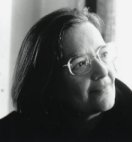
 |

|
The Miracle Worker: An Interview with Agnieszka Holland on The Third Miracle March 23, 2000 by Dan Lybarger Originally appeared in the March 23-March 29, 2000 issue of Pitch Weekly. ........................................................................................................ Although the sordid content of popular entertainment has been discussed at length, there has been no shortage of stories about religion. From Touched by an Angel to Stigmata to Dogma to God, The Devil, and Bob, spiritually themed works have been legion. Still, faith is a serious subject, and none of these shows has given the topic the depth it deserves. Polish filmmaker Agnieszka Holland (Europa Europa, The Secret Garden) offers something different with her latest movie, The Third Miracle. It stars Ed Harris (The Truman Show) as a specialized priest who must determine whether a dead woman is a saint and whether strange events happening in her inner-city neighborhood really are miracles. “I tried to treat the questions of the faith and sainthood in a grown-up, serious way,” Holland says from her home in Los Angeles. “I tried to make the story as attractive as possible on the dramatic level but at the same time to tell a real story about real people. I tried to explore miracles not as a metaphor but as a reality as well. “It’s a tricky game because today the subjects of faith and metaphysics are reserved for horror or total kitsch, like Pax Television and the stuff like that. At the same time, when you analyze the history of human civilization, you see that the most exciting, beautiful, and grandiose achievements of human creativity were inspired by that. Today, why we are unable to treat it on a different level than the kitsch level or satire level, that is an interesting question. I didn’t feel that I reversed this trend, but I tried to make the attempt to make a serious, honest movie about it.” To make The Third Miracle a viable spiritual journey, Holland deviated from the novel on which the film is based. Whereas the book was set in the 1990s, Holland changed the time period to the late ’70s. She explains, “The Vatican changed the rules in ’84. Now it’s not three miracles that are required (for sainthood); it’s enough to have one. The plot was very much based on this reality. I had to change the (time period) so that it was accurate. Even if very few people know about that, I felt that I had to be historically accurate.” She also gave the movie a more ambiguous ending. “In terms of the movie, I left it open because it (allows) people to think,” Holland says. “They can really examine their own beliefs if the story doesn’t have a stupid conclusion. Everyone (analyzes) it in their own way. Some people think that the third miracle never happens. American audiences are used to having everything explained, but you always find enough people looking for something more challenging.” Likewise, the director brings much of her own background to the movie. She was born in 1948 to a Jewish father and a Catholic mother. When asked about how her divided experience influenced the film, she quickly suggests that the word “independent” would be more appropriate than a religious label. “I go there from my own kind of way,” she says. “It’s not that I’m heavy with the luggage from somebody else’s education. It’s interesting for me to play with the mystical element in a physical dimension. Even if I am unable to completely believe in that, I love to try. My attitude is very ambiguous in that way. I did a Jewish mystical play, The Dead Book, for Polish television, and it was very interesting to see the parallels.” Holland’s unusual approach extended to her casting. Harris had worked for her before in the 1988 fact-based Solidarity Union drama, To Kill a Priest, in which he played a conflicted Polish Communist official assigned to kill a popular activist priest (Christopher Lambert from the Highlander movies). Holland recalls, “It was the paradox of To Kill a Priest that (Harris) was more charismatic than the priest. In some ways his problems were more spiritually interesting, not only because negative characters are more interesting to show but because of the quality of the actor. (For The Third Miracle) I knew only that with a special actor I can build this movie in a credible way. The center of the story is the inner struggle of this priest. If you don’t believe in the depth and honesty of his search, the story doesn’t work. Without his agreement, I would not do it.” Holland also re-teamed with Armin Mueller-Stahl (Shine), who played the lead in her 1985 Holocaust drama, Angry Harvest. Their work in that German film earned an Oscar nomination for Best Foreign Film, despite the fact that the two have been unable to converse until recently. Holland says, “I didn’t speak German, and Armin’s English was very basic. We had to communicate through an interpreter, but still it worked pretty well.” Holland’s independent attitude has gotten her into trouble in the past. She was arrested for participating in the anti-Communist protests around Czechoslovakia in 1968, and she lived in exile from Poland after 1981 because of her involvement in the Solidarity movement. Holland’s struggles have been as publicized as her movies, but she demonstrates little bitterness. “It wasn’t so bad,” she says. “My life wasn’t threatened, so it was just unpleasant. People romanticize the struggles with the life. Even in this last century, a lot of people went through terrible experiences, especially with Stalin and the Communists. But certainly it taught me a lesson. I think it gave me more than it took from me.”
Back to Home
|
|
ADVERTISEMENTS............................................................................ |
|
| Lybarger Links is hosted on tipjar.com |
>>>Get Sponsored <<<<
 |